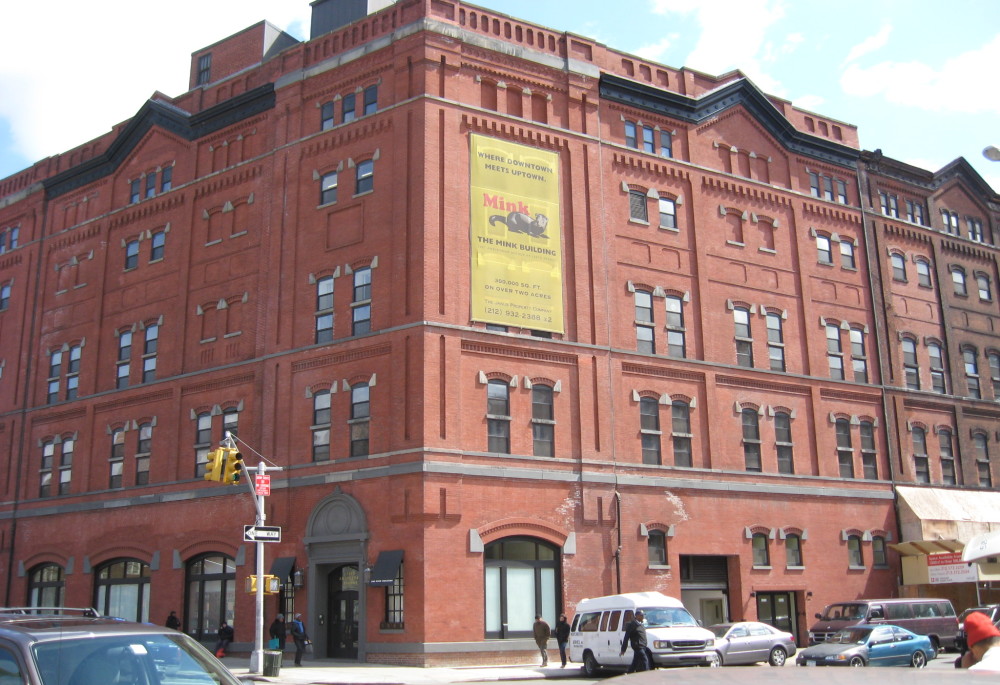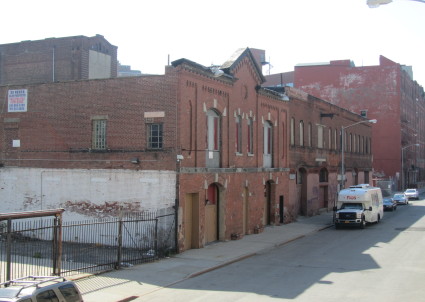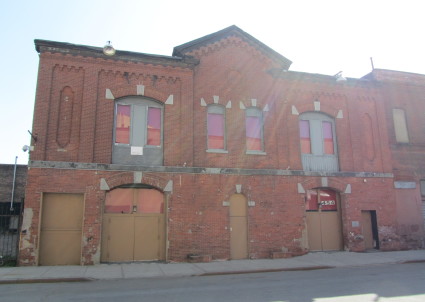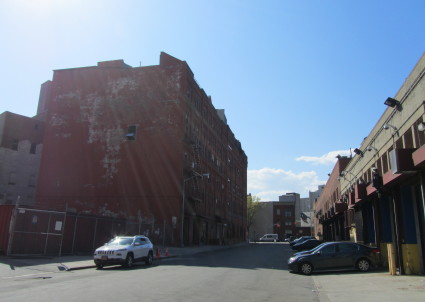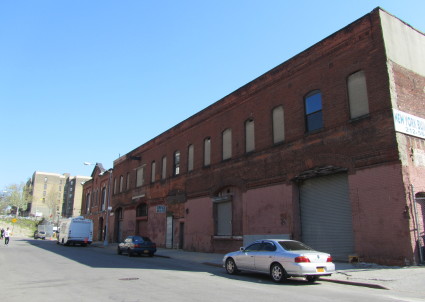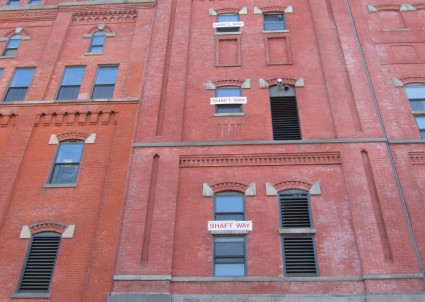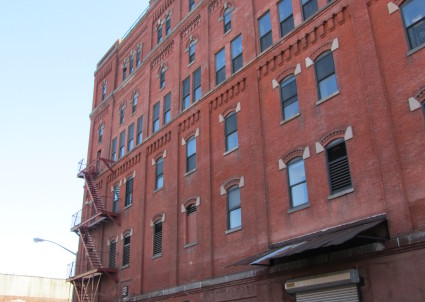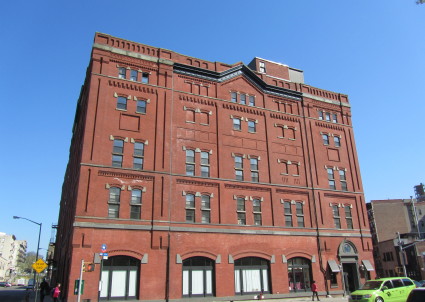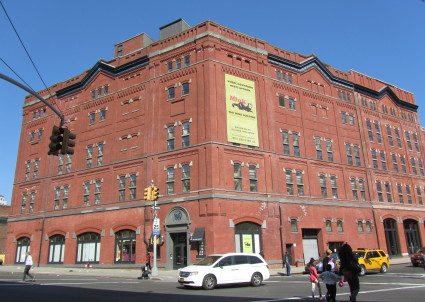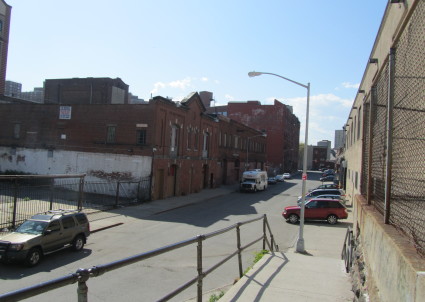Yuengling Brewing Complex (6 sites), Manhattan
Address: Amsterdam Ave at West 127th & 128th Streets
Constructed: 1905
LPC Action: Calendared 1991
LPC Backlog Hearing: Removed from calendar without prejudice
The Yuengling Brewing site in Harlem is the last surviving brewing complex in Manhattan. In the late 19th century, beer brewing was an industry as big as finance or real estate in 21st century New York, yet very few buildings survive to tell this story. This complex predates residential development in Harlem, which was chosen due to its relative isolation at the time. A brewery operated on this site as early as 1860, and the earliest buildings in the complex date to 1876, with significant expansion and alterations dating to 1903. The complex closed in 1920 with the advent of Prohibition, but the buildings have been excellent containers for adaptive reuse. The buildings, designed mostly in the American Round Arch style popular for industrial buildings at the time, retain a strong sense of place and serve as reminders of a great industry.
LPC Statement of Significance:
A reminder of the period when brewing was a major industry in New York, this complex of buildings with frontages on Amsterdam Avenue, West 126th Street (formerly Lawrence Street), West 127th Street, and West 128th Street, is the larger, more architecturally distinguished and intact of the two groups of brewery buildings surviving in Manhattan. (The other buildings are 646 and 662 First Avenue which once formed part of the Kips Bay Brewery.) In 1879, there were 79 breweries in Manhattan and in 1898 New York produced more barrels of beer than any other city in the country. The complex was in continual use as a brewery, under various names, from 1875 until prohibition in 1920 and again from 1933 to 1941.
While portions of the complex date back to the 1870s, it took on its current appearance during the early 20th century when it was operated as the Bernheimer & Schwartz Pilsener Brewing Co.
Brewery associations with the site go back to the mid-1860s when a brewery known first as the Excelsior Brewery and later as the Manhattan Brewery, was in operation at the northeast corner of Amsterdam Avenue and West 128th Street. In 1875, this property was acquired by a consortium of investors headed by David G. Yuengling, Jr., son of the founder of Yeungling Brewery, which was established in 1829 in Pottsville, Pa., and it today the oldest operating brewery in the United States. Under Yuengling, the brewery underwent a considerable expansion, extending eastward along 127th Street. The brewery was highly successful until the Panic of 1893 when many firms suffered financial hardships, which was followed by a series of family and financial scandals, and resulted in the brewery's foreclosure in 1893, although it continued to operate under the Yuengling name. In 1897 the complex was sold to Yuengling's brother-in-law, John Frederick Betz, a successful brewer in Philadelphia, New York and Jersey City. In 1903, it was sold to Samuel and Max Bernheimer, Anton Schwartz, and Arthur Friedland. The Bernheimers immediately undertook a majoy renovation and expansion of the brewery enlarging buildings on West 128th Street and constructing new buildings on West 126th and 127th Streets and Amsterdam Avenue. During Prohibition the buildings were adapted for use by a variety of businesses including a dairy, cold storage warehouse, and laundry. All but two of the buildings, 454-458 West 128th Street and 460-470 West 128th Street and the stable at 454-458 West 128th Street were returned to brewery use by Horton's Pilsner Brewing Company during the 1930s.
The complex is an excellent example of the industrial use of the American Round Arched style, an interpretation of the German Romanesque Revival or Rundbogenstil style developed in Germany during the 1830s and 1840s. This style is characteristic of American 19th century industrial architecture and specifically brewery architecture. The style was largely characterized by the use of round or segmentally arched openings, pilasters and horizontal bands forming girds, elaborate brick corbelling and molded surrounds. The Yuengling complex displays extensive brickwork, pilaster strips and stories arranged into groupings by stone string courses with segmentally or round-arched windows set off by imposts, keystones and denticulated moldings, as well as extensive corbelling and recessed panels. The earliest portions of the complex were designed by Anthony Pfund, a nationally-significant architect specializing in brewery complexes. The remaining buildings were designed by Louis Oberlein, also a specialist in brewery design, who had previously worked for the Bernheimers.
The building now known as 1361-1369 Amsterdam Avenue aka 492-498 West 128th Street and 484-490 West 128th Street has a complex building history. It was originally two separate buildings designed by Anthony Pfund consisting of 484-486 West 128th Street, a four-story ice house of 1874 for Manhattan Brewery, and 488-490 West 128th Street, a four-story brewery of 1876-77 for Yuengling. The buildings were cojoined and raised two stories by Louis Oberlein for Bernheimer and Schwartz and eventually linked to a new structure on Amsterdam Avenue also designed by Oberlein for the Bernheimer & Schwartz that was built in two phases in 1905-06 and 1911-12 and was used for cold storage. Alterations include converting ground floor window openings to storefront windows, enlarging second and third story window openings on the Amsterdam Avenue, West 126th and West 128th Street facades, enlarging fourth story windows on West 128th Street facade, replacing windows and doors and constructing visible rooftop additions.
461-479 W. 126th Street was built as two separate structures, now joined. 473-479 was designed by Oberlein and probably building in 1911-12. 461-467 was also designed by Oberlein and built 1904-05. Alterations include enlarging ground floor openings and windows at the upper stories and constructing a visible rooftop addition at 473-479 and sealing some ground floor openings and replacing doors and some windows at 461-467.
454-458 W. 128th Street is a two-story stable building designed by Anthony Pfund in 1876 for the Yuengling Brewery. Alterations include replacing windows and doors.
The additional structures in the brewery complex were built later in styles other than the American round arch style and the Research Department recommends that these buildings not be designated.
439-449 West 127th Street was built in 1912-14 in the Industrial Neo-classical style and designed by Frederick Keeler, although Louis Oberlein may have contributed to the design. Alterations include sealing ground floor openings and replacing six second-story windows.
437 W. 127th Street was built to store malt bins. Originally part of the building at 439-449 West 127th Street it is now joined to 433 West 127th Street.
433 W. 127th Street assumed its current appearance in 1934-36 when a former one-story storage building was raised to three stories by architect Frank Rooke for the Horton Pilsner Company. Alterations to this no style building include replacing windows and installing a roll-down gate.
423-427 W. 127th Street is an Industrial Neo-classical style loft building designed by Frederick Keeler for Bernheimers and built in 1912-13. Alterations include replacing windows, doors and ground floor infill.
460-470 W. 128th Street was designed by Paul F. Schoen for Yeungling and constructed in 1883-84. This Utilitarian style building was used for the production and storage of ale. Alterations include replacing and sealing of windows and doors.
